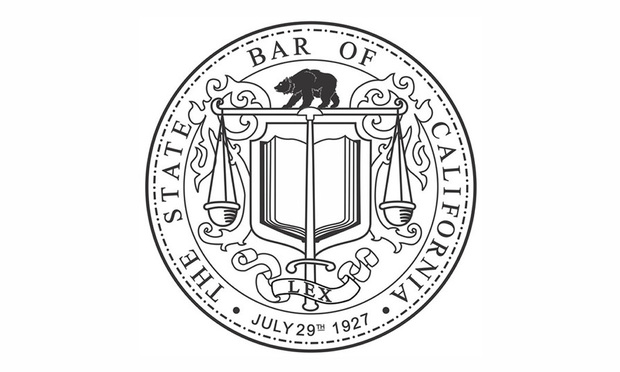California's Plan for Legal Fee Sharing, 'Regulatory Sandbox' Take Final Shape
The American Bar Association this month adopted a resolution encouraging state bars to consider "innovative approaches" to expanding legal services.
February 21, 2020 at 06:23 PM
5 minute read
 State Bar of California's logo.
State Bar of California's logo.
A state bar committee charged with proposing ways to increase access to legal help in California holds its final scheduled meeting Monday, drawing to a close 14 months of work that has been lauded as innovative and criticized as a threat to consumers.
The Task Force on Access Through Innovation of Legal Services will gather in San Francisco to consider a daylong agenda with eight proposals. The recommendations—many scaled back from concepts introduced last year—include allowing fee sharing with nonprofits, creating a pilot program for new services called the "regulatory sandbox," and changing rules on legal advertising.
The 22-member group's final report is expected to go to the bar's board of trustees March 12.
The potentially sweeping changes in rules governing California's legal profession have been introduced as states throughout the nation grapple with how to serve large segments of the population who can't afford lawyers or don't know how to access the legal system.
The American Bar Association this month adopted a resolution encouraging state bars to consider "innovative approaches" to expanding legal services. The Conference of Chief Justices in February also approved a similar nonbinding measure, which said traditional legal aid approaches "are not likely to resolve the gap" between needs and services.
"We're really looking at empowering people who aren't going to lawyers to begin with or may not even need a lawyer," said Utah Supreme Court Justice Deno Himonas. Himonas chairs a Utah Supreme Court-created task force working on regulatory changes to encourage more legal access. That group's work is being closely eyed in California and other states.
But lawyers and other decision-makers in the Golden State have not been quick to warm to the proposed changes, especially those that would potentially give non-lawyers a toehold in the profession. A public comment period on the regulatory proposals drew approximately 3,000 responses last year, many of them critical.
There's no open enthusiasm for change in the Legislature, which has focused in recent years on cracking down on those practicing law without a license. The state Assembly Judiciary Committee is holding a hearing Tuesday on helping unrepresented litigants, but the task force and its proposals are not on the agenda.
Established lobby interests in the Legislature, including those representing plaintiffs attorneys and defense counsel, oppose altering professional rules for lawyers. The California Supreme Court, too, has not publicly championed the task force's proposals.
A verbal exchange at the task force's Feb. 4 meeting reflected the tension between those who want changes and those who are wary.
"There are many of us who are genuinely and properly concerned about consumer protection and the issues we already have with non-lawyers," Mark A. Lester, a Southern California estate planning lawyer, told task force members.
"I am constantly faced with documents that are inadequate," Lester said, referring to clients who bring him paperwork completed with a non-lawyer's help. "They were trying to do the right thing, but they caused more damage and hundreds of thousands of dollars in damage and/or attorneys fees. We need to have competent representation for our consumers out there."
"If you are so concerned about protecting consumers, what are you doing to proactively help those that are in need?" task force member Simon Boehme shot back. He continued: "I understand the need to protect the interests of consumers and the public. But right now the consumers and the public are struggling terribly. There is no representation available to them. There are no good solutions. And I'm curious where your concern is to create proactive solutions rather than being protectionist."
One of the key proposals under consideration by the task force is the idea of a regulatory sandbox, time-limited program that, with regulatory approval, would free service or product developers from existing professional rules or statutes that currently hinder their work.
A report accompanying the sandbox proposal points as an example to a developer working on a platform to help people with small claims court. A regulatory panel, appointed by the California Supreme Court or state bar, could exempt that developer from laws governing legal document assistants and monitor his or work to ensure consumer protection, the report says.
Information about the product's effectiveness in helping expand services would be collected. At the end of a multiple-year "sandbox period," regulators would decide whether to pursue formal rule or legal changes to allow further development of such products and services.
Utah is already developing its legal sandbox, which may be up and running this summer, Himonas said. The justice said he's already heard from entrepreneurs interested in working under the new system.
This content has been archived. It is available through our partners, LexisNexis® and Bloomberg Law.
To view this content, please continue to their sites.
Not a Lexis Subscriber?
Subscribe Now
Not a Bloomberg Law Subscriber?
Subscribe Now
NOT FOR REPRINT
© 2025 ALM Global, LLC, All Rights Reserved. Request academic re-use from www.copyright.com. All other uses, submit a request to [email protected]. For more information visit Asset & Logo Licensing.
You Might Like
View All

Cleary Nabs Public Company Advisory Practice Head From Orrick in San Francisco

The Rise of Female Breadwinners: Challenging Traditional Divorce Dynamics
4 minute read
An Overview of Proposed Changes to the Federal Rules of Procedure Relating to the Expansion of Remote Trial Testimony
15 minute readTrending Stories
Who Got The Work
J. Brugh Lower of Gibbons has entered an appearance for industrial equipment supplier Devco Corporation in a pending trademark infringement lawsuit. The suit, accusing the defendant of selling knock-off Graco products, was filed Dec. 18 in New Jersey District Court by Rivkin Radler on behalf of Graco Inc. and Graco Minnesota. The case, assigned to U.S. District Judge Zahid N. Quraishi, is 3:24-cv-11294, Graco Inc. et al v. Devco Corporation.
Who Got The Work
Rebecca Maller-Stein and Kent A. Yalowitz of Arnold & Porter Kaye Scholer have entered their appearances for Hanaco Venture Capital and its executives, Lior Prosor and David Frankel, in a pending securities lawsuit. The action, filed on Dec. 24 in New York Southern District Court by Zell, Aron & Co. on behalf of Goldeneye Advisors, accuses the defendants of negligently and fraudulently managing the plaintiff's $1 million investment. The case, assigned to U.S. District Judge Vernon S. Broderick, is 1:24-cv-09918, Goldeneye Advisors, LLC v. Hanaco Venture Capital, Ltd. et al.
Who Got The Work
Attorneys from A&O Shearman has stepped in as defense counsel for Toronto-Dominion Bank and other defendants in a pending securities class action. The suit, filed Dec. 11 in New York Southern District Court by Bleichmar Fonti & Auld, accuses the defendants of concealing the bank's 'pervasive' deficiencies in regards to its compliance with the Bank Secrecy Act and the quality of its anti-money laundering controls. The case, assigned to U.S. District Judge Arun Subramanian, is 1:24-cv-09445, Gonzalez v. The Toronto-Dominion Bank et al.
Who Got The Work
Crown Castle International, a Pennsylvania company providing shared communications infrastructure, has turned to Luke D. Wolf of Gordon Rees Scully Mansukhani to fend off a pending breach-of-contract lawsuit. The court action, filed Nov. 25 in Michigan Eastern District Court by Hooper Hathaway PC on behalf of The Town Residences LLC, accuses Crown Castle of failing to transfer approximately $30,000 in utility payments from T-Mobile in breach of a roof-top lease and assignment agreement. The case, assigned to U.S. District Judge Susan K. Declercq, is 2:24-cv-13131, The Town Residences LLC v. T-Mobile US, Inc. et al.
Who Got The Work
Wilfred P. Coronato and Daniel M. Schwartz of McCarter & English have stepped in as defense counsel to Electrolux Home Products Inc. in a pending product liability lawsuit. The court action, filed Nov. 26 in New York Eastern District Court by Poulos Lopiccolo PC and Nagel Rice LLP on behalf of David Stern, alleges that the defendant's refrigerators’ drawers and shelving repeatedly break and fall apart within months after purchase. The case, assigned to U.S. District Judge Joan M. Azrack, is 2:24-cv-08204, Stern v. Electrolux Home Products, Inc.
Featured Firms
Law Offices of Gary Martin Hays & Associates, P.C.
(470) 294-1674
Law Offices of Mark E. Salomone
(857) 444-6468
Smith & Hassler
(713) 739-1250






